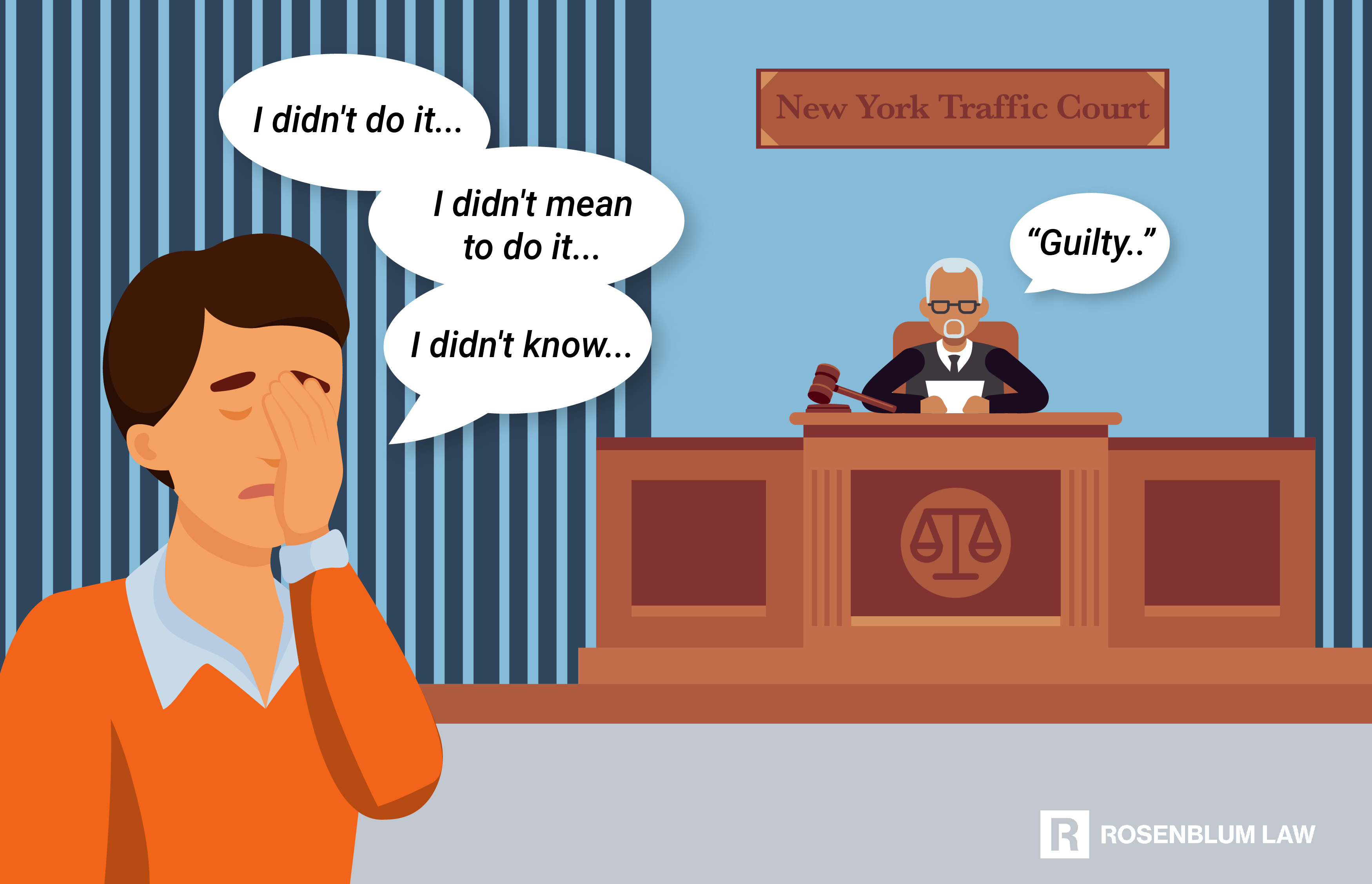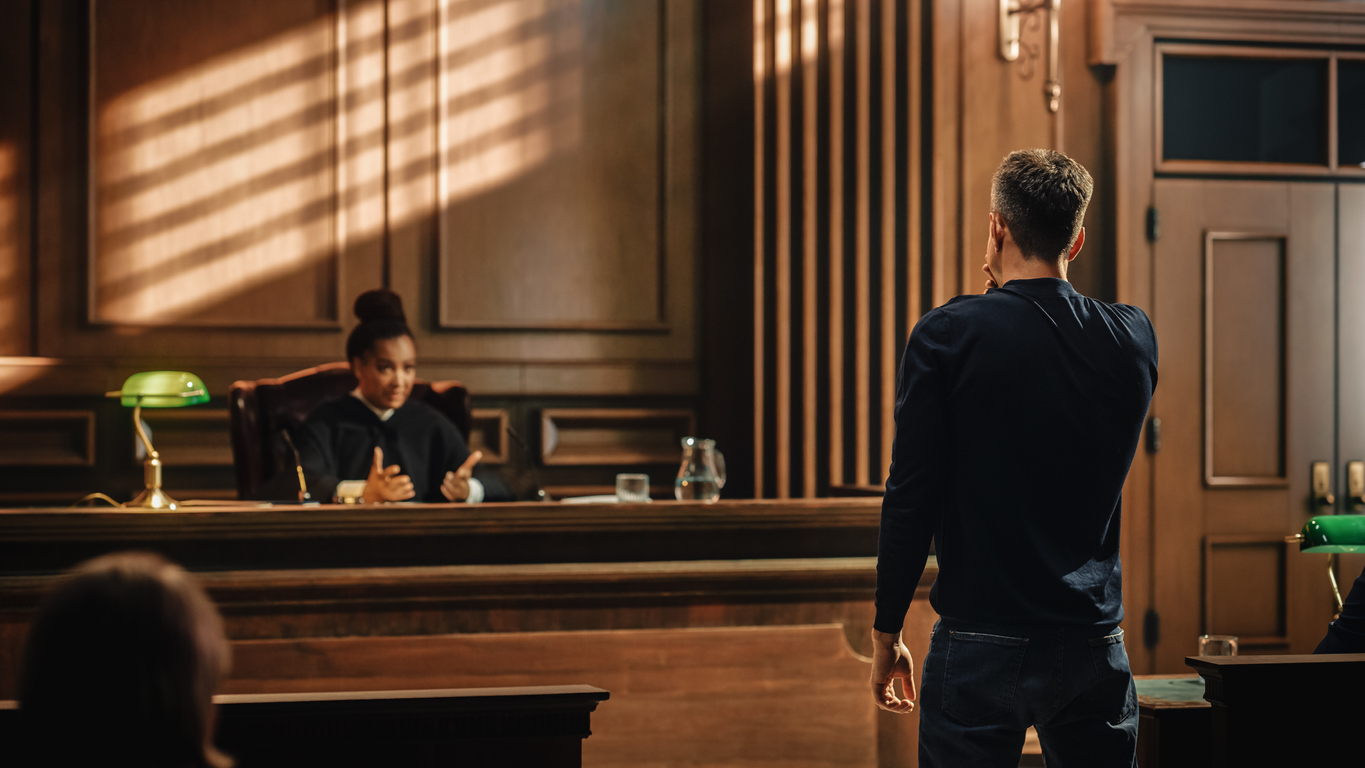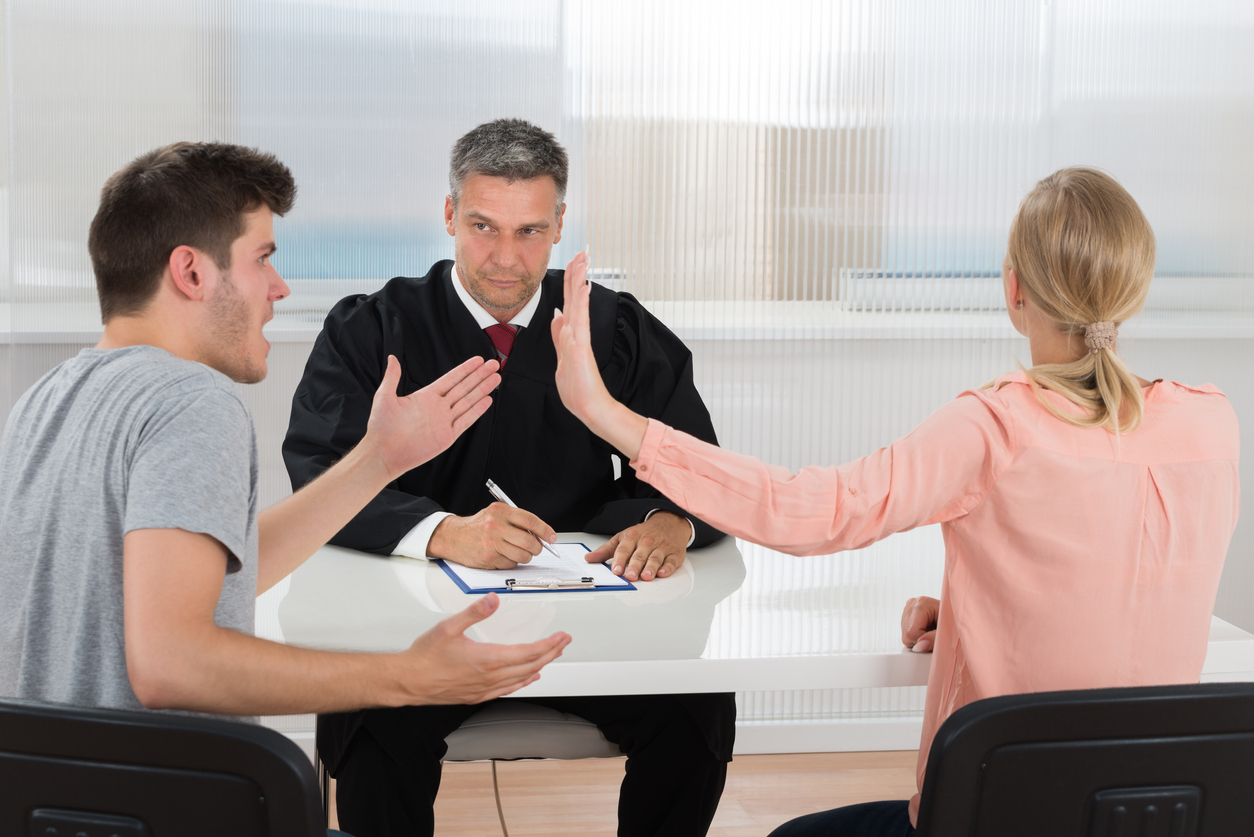
Most people view traffic tickets as a simple nuisance. They aren’t wrong…dealing with a traffic ticket is unpleasant, but this doesn’t mean they aren’t incredibly important. An unfortunate consequence of this point of view is the misconception that you can always successfully represent yourself in TVB court. But, what people don’t understand is that beating a traffic ticket can be as complicated as winning any other type of legal case. In our experience, those who think they can represent themselves often lose otherwise winnable cases. That’s why it’s best to hire an attorney to beat a traffic ticket.
How a Traffic Ticket Trial Works
It is important to first understand how a traffic ticket trial works. When you take your traffic ticket case to trial, the court’s job is to determine your guilt or innocence. There are three main stages to a traffic ticket trial.
Note that this article breaks down how procedures in the TVB operate.
Stage 1. Police Officer/Prosecutor Testifies
The police officer that ticketed you will prosecute the case. In court, they will explain what led them to give you a ticket and why they believe you are guilty of the traffic violation. Any non-criminal moving traffic violations in the five boroughs of New York City will be handled by the TVB. This allows courts in the area to focus on other criminal cases. If you plead not guilty to a traffic ticket in one of these TVB areas, your case will be heard by a DMV Administrative Law Judge who is a legal expert in the area of Vehicle and Traffic Law.
The officers and judges in this court will be experts in the area of vehicle and traffic law, and the average person, even the average lawyer, likely isn’t. For obvious reasons, you need to make sure the attorney you select has experience with the TVB because if you’re involved in a non-criminal moving traffic violation, you will end up here.
Stage 2. Defense Cross-Examines and Presents Its Case
Once the officer or prosecutor has presented their case, you will have the opportunity to question them. You will also get to present your side of the story, using witnesses and evidence.
Stage 3. Verdict and Sentencing
Once you have presented your case, the judge will decide whether to find you guilty or not guilty. If you are found guilty, the judge will hand down a sentence.
Why Do People Choose to Represent Themselves in the TVB?
In our experience, there are many reasons why motorists consider representing themselves in the TVB. These include things like an inability or unwillingness to pay for an attorney or potentially a general ‘do-it-yourself’ attitude. A more interesting question is what actually makes these motorists go through with representing themselves? In our view, these motorists are misguided by a common misconception about traffic tickets. The thinking is something like this:
Traffic tickets are not serious, so TVB court is not serious. And since TVB court is not serious, you do not need an attorney to present your side of the story. Plus, the judge will give you a break when they see that you are not an attorney.
What’s wrong with this? Let’s break it down.
“Traffic tickets are not serious, so the Traffic Violations Bureau cannot be that serious.”
This is plainly false. Traffic tickets are certainly serious, and so is the TVB. Even minor traffic tickets can carry substantial penalties that can cost you plenty and could take you off the road for months. The TVB plays by the same, if not more, complex legal rules as any other court, so it is important to take it seriously.
“Since the Traffic Violations Bureau Court is not serious, you do not need an attorney to present your side of the story.”
Again, both traffic tickets in local courts and TVB hearings are serious. Your trial is not just about “telling your side of the story.” Your job is to make effective legal arguments that will persuade the court to rule in your favor. But to succeed in court, on top of your arguments you must have enough of a grasp on the legal system to navigate its complicated procedures. Non-lawyers, having not been educated about the law and having little to no trial experience, will not know how to do any of this effectively, but an attorney will.
“The judge will give you a break when they see that you are not an attorney.”
This misconception is only a half-truth, making it all the more dangerous. It is true that some judges will do their best to be understanding and patient with a non-lawyer, but this doesn’t mean you will get any better treatment as a result. The court’s leniency ends where the law comes into play. The TVB judges are not inclined to sacrifice legal requirements to give uninformed motorists a break. If the evidence against you is strong, nothing other than sound legal arguments will help you avoid punishment.
Why It’s a Bad Idea to Represent Yourself in the (TVB)
Representing yourself is very dangerous when your ticket was issued in New York City. Non-criminal moving traffic violations in the five boroughs of New York City go to the Traffic Violations Bureau (TVB), a division of the New York Department of Motor Vehicles that was set up to handle the large volume of tickets in the city. It is a bad idea to represent yourself in the TVB because the laws and procedures are simply too complicated for a non-lawyer to be successful. When you represent yourself in the TVB, you risk potentially losing an otherwise winnable case, which may leave you with significant consequences that you might have avoided with the help of an attorney. The risk is greater at the TVB because they have a lower standard of proof than traditional traffic courts, meaning it takes less evidence to convict someone of a traffic violation at a TVB trial than in a traffic court.
Another significant reason is that the officer that is involved will be prosecuting the case against you, and the DMV administrative judges in the TVB are experts in vehicle and traffic law. If you attempt to represent yourself in such a case, you will likely be overwhelmed and make mistakes, resulting in undesirable outcomes to say the least. When dealing with the TVB, or any court for that matter, it is a must to have expert legal representation on your side to ensure you get the best possible outcome and are not overly punished.

Need help with your NYC Traffic ticket?
Representing Yourself: A TVB Case Study
The pitfalls of representing yourself in the TVB are well illustrated by the real-life case of Carlos D.
Facts
Carlos was pulled over and ticketed for speeding on the Robert F. Kennedy Bridge. The officer later testified that he first estimated Carlos was driving 60 miles per hour; the speed limit was 40 miles per hour. The officer’s speed laser gun then confirmed his suspicion, measuring Carlos’s speed to be 64 miles per hour. According to the officer, when he pulled Carlos’s vehicle over, Carlos apologized and said he did not know the speed limit. The officer further testified that on the road where Carlos was speeding, there were two signs indicating the 40 miles per hour speed limit. These signs were said to be unobstructed and without any graffiti, meaning Carlos had no reason to be unaware of the speed limit.
Carlos’s Defense
Carlos’s trial for his speeding ticket was handled by the TVB. He was given the opportunity to question the police officer and to present his side of the story with any evidence or witnesses as he pleased. Following is an excerpt of the transcript from Carlos’s trial. In this section, Carlos is presenting his defense to the court.
As you can see, Carlos’s defense consists of three main points:
- This violation happened three years ago, so I don’t remember what happened very well.
- I apologize for speeding.
- I came to court hoping the court would take pity on me because I need my license for my job.
Analyzing Carlos’ Defense
The purpose of this case study is not to pick on Carlos, but his defense is an example of the ineffective arguments people commonly make in TVB court and, consequently, why it is a bad idea to represent yourself. Given that he has no formal legal training, there is no reason for him to be an expert at making arguments in court. Our entire point, in fact, is that winning in court is difficult, so people like Carlos should hire an attorney rather than go it alone. Let’s examine Carlos’s three points in depth and consider how they might be viewed by the court.
Point #1: This was a long time ago; I don’t remember.
This is an honest and understandable statement. Most of us will not remember a traffic stop from three years ago. However, just because it is honest does not mean it should be uttered in court. The trouble is with the message this sends to the court. If you begin your testimony by saying “I don’t recall very well,” expect the court to view whatever you say after that with a lot of doubt. For example, if you follow that up with something like “I was looking at my speedometer closely, and I was definitely within the speed limit,” the court will probably think “that might sound reasonable, but how can we trust this is true if you don’t remember very well.” This sort of statement shows how a lack of courtroom experience can negatively affect a case. In the real world, this sort of candid honesty is natural. But in the courtroom, it is a strategic error.
Point #2: I apologize.
The next statement in Carlos’s defense after “I don’t remember very well” is “I’m sorry for committing the offense.” This amounts to an admission of guilt. If you apologize for committing the offense you are charged with, you are implying that you committed the offense. Here, it seems Carlos really didn’t dispute that he committed the offense. It seems that he misunderstood what he could achieve in TVB court, which is evident in his next point, where he asks for leniency. But it’s worth noting that sometimes people will say they’re sorry at trial even if they dispute the accusations made against them. And this makes sense outside of the TVB courtroom. We say “sorry” all the time when we don’t believe we did the thing we are being accused of. In the real world, an apology when you don’t think you’ve done anything wrong might signal that you nevertheless acknowledge how the other person is feeling. This is not so in the TVB courtroom. An apology in the TVB courtroom usually implies an admission of guilt and is therefore not appropriate.
Point #3: Please have mercy; I cannot afford to lose my license.
Carlos’s final plea to the TVB is for them to be lenient because he needs his driver’s license for his job. This is another common argument non-lawyers make in TVB court. The mistake Carlos and all others who use this sort of argument make is misunderstanding what the TVB is able to do for them. Even if the court genuinely wants to help you, which many times they do, they are limited by the law. Especially when you’re dealing with the TVB, they will not be able to help cut you a better deal in most cases because they have very strict rules. You often cannot get a plea deal in the TVB. In this case, Carlos had enough past violations that if he was convicted of speeding, it would be mandatory that his license was revoked. So despite Carlos’s plea, the TVB cannot help him in the way he wants without disobeying the law. When the court cannot do what you are asking them to, your pleas for mercy are ineffective. It is also worth noting that even if the court can help you, such as by giving you a fine on the lower end of the range provided under the law, pleading for leniency won’t necessarily work. Put yourself in the DMV Administrative Judge’s shoes. They see traffic law violators every day and hear the same excuses time and again. Even if your reasons are genuine, the court might not be able to distinguish you from a careless lawbreaker who might break the law again if they aren’t punished.

What Might an Attorney Have Done?
To say exactly what an attorney might have done if they were representing Carlos is difficult. The trouble is that all we know about Carlos’s side of the story is what he said at his trial, which doesn’t tell us very much. Nonetheless, even knowing little about the facts beyond the police officer’s recollection, it is apparent that there are a few things an attorney could have done to help Carlos.
1. Question the Police Officer’s Testimony
Once the police officer presents their case, you have an opportunity to cross-examine, meaning you can ask questions of the police officer with the goal of poking holes in their case. Here are two excerpts of the trial transcript showing some of the officer’s testimony about his speed laser gun.
One potentially effective defense tactic at a speeding ticket trial is to question the accuracy of the speed laser gun. Here, the officer testified that their speed laser gun passed calibration tests twice, once before the traffic stop and once after. However, the officer failed to explain their methodology for calibrating and testing the speed laser gun. An attorney might have questioned the officer on this point, probing for a weakness in the evidence. Maybe the officer didn’t perform the appropriate tests. If questioning reveals this fact, this can undermine a key piece of the officer’s evidence in the judge’s eyes.
2. Ask the Court for a “Speed Reduction” Based on Margin of Error
Even if Carlos admitted that he was driving over the posted speed limit, he might have reduced his penalties by asking for a “speed reduction.” The basic idea is that whatever the officer uses to measure your speed will have a margin of error, meaning it will be inaccurate to a certain degree. The officer should tell the court what that margin of error is. This margin of error can then be used to ask the court to reduce the speed you are said to have been traveling to account for this inaccuracy. Consider the officer’s testimony about margin of error at Carlos’s trial:
The officer testifies that his visual estimation of a car’s speed is accurate plus or minus five miles per hour. This means that if he looks at a car and estimates it is driving 45 miles per hour, its actual speed can be anywhere between 40 and 50 miles per hour, five miles up or down from his estimate. He goes on to say his speed laser gun is accurate plus or minus one mile per hour. An attorney representing Carlos might have used this testimony to ask the court to reduce Carlos’s speed, which would in turn reduce the penalties. Remember, Carlos was said to be traveling 64 miles per hour in a 40-mile-per-hour zone. Driving 24 miles per hour over the speed limit results in a six points on the offending driver’s license. However, the number of points goes down to just four if the driver is traveling 20 miles per hour over the speed limit. So, to achieve this reduction, Carlos’s speed would have to be at most 60 in a 40 miles per hour zone.
This is where the margin of error comes into play. The speed gun reading doesn’t help Carlos here because it is only inaccurate plus or minus one mile per hour. So this margin of error would only put Carlos, at best, at 63 miles per hour. However, the margin of error for the officer’s visual estimation is plus or minus five miles per hour. Using this margin, Carlos could ask the court to reduce his speed to 60 miles per hour, which is four miles less than what the speed laser gun detected. This would reduce Carlos’s penalties significantly.
3. Verify the Accuracy of the Sentence
A final mistake that an attorney could have addressed is ensuring the judge’s sentence was legally appropriate. Consider this excerpt of the judge’s discussion of Carlos’s sentence.
The judge points out that this was Carlos’s third speeding violation in eighteen months, which made the revocation of his driver’s license mandatory. If we had included the remainder of the transcript, you would have seen that Carlos never questioned this decision. Now, the judge is correct that three speeding violations in an 18-month period results in a mandatory revocation. The trouble is that Carlos never verified exactly when the other speeding violations were recorded as having taken place. Judges are not perfect and experienced traffic attorneys are aware of this. It is possible that the judge could have miscounted, or that the record had the speeding violations listed with inaccurate dates. An attorney might have respectfully asked the judge to confirm what dates they are looking at, cross-referenced those dates with the attorney’s own records, and pointed out any inaccuracies if they existed. If a mistake were there, this could prove the difference between Carlos losing his license or walking out of the courtroom still able to legally drive.
Other Common Mistakes Made by People Who Represent Themselves
Carlos D. exhibited some of the pitfalls of representing yourself in TVB court. Remember that the main issue is that most people are not able to present a strong legal defense. In this section, we will explore some other general mistakes and ineffective arguments commonly made in TVB court.
Procedural Mistakes
Procedural mistakes are some of the most common and most frustrating mistakes made in TVB court by people representing themselves. Attorneys are trained to understand the court’s many complex procedural rules and to observe their importance. Non-lawyers, on the other hand, usually don’t understand the rules and often don’t try to because they are unaware of how important the rules are to the court. The frustrating thing about these mistakes is that you wind up feeling like even when you’re right, you’re wrong.
A good example is the case People v. Chess. Mr. Chess represented himself in his speeding ticket trial. When Chess was convicted of speeding, he felt fundamentally wronged because he was not allowed to submit photo evidence that he claimed would prove his innocence. The photo evidence may well have done just that, but an appeals court confirmed that the court was right to deny this evidence because Chess failed to follow the procedural rules. The rule the court cited was that a proper foundation for photo evidence has to be established in court through testimony that the photograph “accurately represent[s] the subject matter depicted.” So, Chess’s lack of awareness of this procedural rule potentially denied him the chance to prove his innocence.
Arguments That Just Don’t Work

1. “I didn’t do it.”
Earlier, we explained that Carlos D. should have avoided apologizing for speeding because apologizing implied he committed the offense he was charged with. The basic idea is that you are going to trial because you believe you didn’t do what you are being accused of, so your position at trial should be that you are not guilty. In this sense, arguing that “you didn’t do it” makes complete sense. However, it becomes problematic when it is the only thing you offer the court. Technically, claiming you didn’t do something is not an argument. An argument consists of something you claim to be true and the reason that “something” is true. Saying you didn’t do what you are being accused of is the right claim to make at trial, but you still need to back that claim up with good reasons and evidence. Even if you cannot prove your innocence, you should be prepared to undermine the State’s case. Otherwise, if the State has enough evidence against you to satisfy what the law requires them to prove, you will be found guilty.
Did you
know?


Adam Rosenblum
2. “I didn’t mean to do it.”
People in the TVB court make a version of this argument all the time. It can also be phrased as “I committed the offense, but I have a good reason why I did it.” This argument encompasses the thousands of excuses someone could have for violating a traffic law:
- “I was speeding because I was late for work and couldn’t afford to get fired.”
- “I was on my phone because I needed to make sure my son got home safely.”
- “I ran a stop sign because my glasses were foggy and my vision is bad, and I was actually on my way to the eye doctor.”
Yes, just as almost anyone ever pulled over with an expired license was “on their way to the DMV.” TVB court judges have heard every excuse in the book, and they are not the least bit persuaded. Similar to John D.’s second point at his speeding trial (I’m sorry for speeding), this type of argument amounts to an admission of guilt. Saying you didn’t mean to do something implies that you did the thing you are being accused of. This argument also fundamentally misunderstands the court’s role. People often think the court is primarily concerned with fairness. So, they think that by showing the court that they didn’t intend to do whatever they are being accused of, they will convince the court not to convict them since it would be unfair to punish someone for something they did mistakenly or for a good reason. While courts are technically concerned with fairness, they are limited by the law. And most traffic laws do not say a motorist is not guilty of a violation unless they actually meant it.
3. “I didn’t know that was the law.”
Ignorance of the law is not an effective defense. It is rejected by the court for a number of reasons. One major one is that even if you genuinely didn’t know the law, it is your responsibility to know it. For example, the “I didn’t know” argument is commonly heard at speeding ticket trials where the driver claims they did not know the speed limit. But when you get behind the wheel and take the road, you are responsible for knowing the rules of the road and observing road signs. Another reason courts will almost always reject the ignorance of the law argument is that it would otherwise be too easily exploited. This is because it is incredibly difficult for a court to determine whether someone is telling the truth when they say they did not know that their conduct was illegal. If the court can’t tell the difference, then everyone could get away with their ticket simply by claiming “they didn’t know.” Beyond being ineffective, this argument can actually work against you, as it borders on implying you are guilty. You are implicitly saying “I did the thing they are accusing me of, but I should not be punished because I did not know that what I was doing was illegal.” This won’t turn out well for you at a traffic ticket trial.
Benefits of Hiring an Attorney
At this point, it should be very clear that representing yourself in the TVB court is not a good idea. Thankfully, there is a fantastic alternative: hiring an experienced traffic ticket defense attorney. Following are five excellent benefits a seasoned attorney can provide you in fighting your traffic ticket:
- Legal Knowledge: Your traffic ticket defense attorney should have extensive knowledge of New York’s Vehicle and Traffic Law. This includes the laws themselves and how the court has applied the laws in the past.
- Procedural Knowledge: When your attorney handles your case, you are able to rest easy knowing that you won’t lose your case on a small technicality. Everything will be filed properly and on time. Also, you will be confident stepping into the courtroom, knowing you are represented by an attorney familiar with how to navigate this space.
- Experience Before the TVB: Having a strong case is only half the battle. Winning cases requires persuading the TVB court. Your experienced attorney will have presented cases before the TVB court so frequently that they will know exactly how to bring them onto your side. This is not to say you will definitely win. But a seasoned attorney’s keen ability to sway the TVB court will usually give you a fighting chance.
- Perspective: One of the most important yet overlooked benefits of having an attorney is the perspective they can provide you. They should have a wealth of experience handling the type of case you are dealing with. Your attorney can use this experience to clarify your options and help you figure out what outcomes are reasonable and realistic. This way, you don’t take a path that destines you for an unfavorable outcome.
Who Should You Contact?
Now that you understand the pitfalls of representing yourself in the Traffic Violations Bureau court as well as the wonderful benefits of hiring an experienced traffic ticket defense attorney, you are ready to place your case in the capable hands of the attorneys at Rosenblum Law. For decades now, we have successfully defended thousands of clients against every traffic offense imaginable, earning us our undisputed reputation as a premier traffic ticket defense firm. E-mail or call 888-815-3649 for a free consultation.


